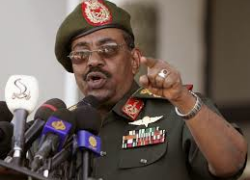The name “Lost Boys” was given to a group of over 20,000 boys, between the ages of 5 and 17, who were separated from their families during the Second Sudanese Civil War (1983-2005). These “Lost Boys” of Sudan trekked enormous distances over a vast unforgiving wilderness, seeking refuge from the fighting that emerged when their Christian villages in southern Sudan were attacked by northern Islamist forces. Orphaned, these boys traveled a thousand miles across 3 countries, Sudan, Kenya, and Ethiopia. During their journey, half of the boys died due to starvation, dehydration, disease, and attacks by wild animals and enemy soldiers. It took these boys 5 years to find safety in a refugee camp in Kakuma, Kenya. U.N. workers gave the “Lost Boys” their name after the lost boys in the fabled Peter Pan story.

In 2000, the United States along with the U.N. High Commissioner for Refugees resettled approximately 3,800 Lost Boys in the United States across 38 cities. The program was stopped after 9/11 for security reasons, though it was eventually restarted in 2004. As these boys prepared to leave their refugee camps for America, they had to be prepared for a life that they could barely comprehend. They had to be taught the concept of an electric stove, indoor bathrooms, and winter; essentially a crash course in America 101. While many of the Lost Boys have become successful, attending medical school, law school, and joining the U.S. military, not all have been so fortunate. It is no surprise that the horrors they faced as children compounded with being shipped to an unknown country, that some have turned to alcohol, drugs, and crime.
The perpetrator of these unimaginable horrors is Sudanese President Omar al-Bashir. He came into power in a coup in 1989 and has ruled Sudan with an iron fist ever since. There are currently 2 arrest warrants for President al-Bashir from the International Criminal Court (ICC). It is alleged that he is criminally responsible for 10 violations of the Rome Statute based upon his individual criminal responsibility. The counts include 5 counts of crimes against humanity, 2 counts of war crimes, and 3 counts of genocide. These warrants require member countries to detain him if he enters into their territories.
Bashir has applied for a U.S. visa so that he may attend the upcoming U.N. General Assembly where he is scheduled to speak. He would be the first head of state to address the U.N. General assembly while facing charges from the ICC, if he shows up as scheduled. The U.S. government has made it clear that it does not want Bashir to arrive in New York, but the U.S. has never banned a visiting head of state that wants to speak to the U.N. Furthermore, per a treaty dating back to 1947, the U.S. is obligated to issue the visa as the U.N. body’s host country. Bashir says he has already booked his flight and hotel and that he is not worried about U.S. authorities arresting him, as demanded by international human rights groups, since the U.S. is not a member of the ICC. Bashir says he has a right to attend the U.N. assembly and that “[n]obody in the U.S. can question me or hold me.”
The Lost Boys suffered as children and still suffer from those memories as adults. Though the U.S. is not a member of ICC, it has ratified the Geneva Convention that punishes those who commit genocide and it has transferred suspects to the ICC before. If he appears in New York, let’s hope that the U.S. remembers the horrors the Lost Boys and millions of others have suffered at the hands of al-Bashir and that the U.S. takes al-Bashir into custody.
Sarah Emery is a 3L and the Executive Editor for the Denver Journal of International Law and Policy

